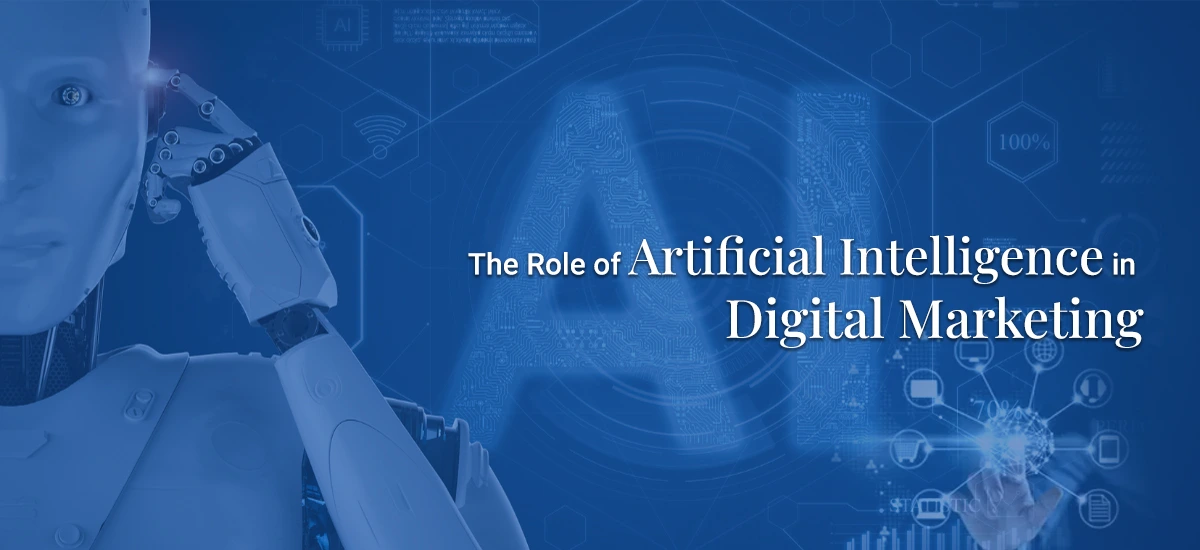
Role of Artificial Intelligence in Digital Marketing – Artificial intelligence (AI) has been a frequently used term in the tech industry for an extended period. However, its impact on the digital marketing industry has been significant and transformative. As a digital marketer, it is important to understand the role of AI in digital marketing and how it is changing the game. In this blog post, we will explore the role of AI in digital marketing and its potential impact on the industry.
What is Artificial Intelligence?

Artificial intelligence (AI) refers to the ability of machines, particularly computer systems, to replicate human intelligence processes. AI is capable of performing tasks that usually require human intelligence, including but not limited to natural language processing, decision-making, speech recognition, and visual perception.
Personalization
One of the biggest benefits of Artificial Intelligence in digital marketing is the ability to personalize marketing messages. With the help of AI, marketers can analyze user data and create personalized campaigns that are more likely to convert. AI algorithms can analyze data points such as search history, purchase behavior, and social media interactions to understand customer preferences and tailor marketing messages accordingly. This results in more relevant and personalized marketing campaigns that lead to higher engagement and conversion rates.
Another significant role of Artificial Intelligence in digital marketing is its ability to predict future trends and behaviours. AI algorithms can analyze large sets of data to identify patterns and predict future outcomes. This allows marketers to make data-driven decisions and optimize their marketing strategies based on predicted customer behaviour. Predictive analytics can be used to forecast sales, identify potential customers, and even predict which products or services are likely to be successful.

Chatbots are another example of how AI is transforming digital marketing. Chatbots use natural language processing and machine learning to interact with customers in a conversational manner. They can answer customer queries, provide product recommendations, and even make purchases on behalf of the customer. This results in a more personalized and efficient customer experience, leading to increased customer satisfaction and loyalty.
AI-powered content creation tools are becoming increasingly popular in the digital marketing industry. These tools use natural language generation to create content, such as product descriptions, blog posts, and even news articles. AI algorithms can analyze data and generate content that is optimized for search engines, resulting in higher search rankings and increased traffic.
AI algorithms can analyze large sets of data to optimize ad campaigns for maximum ROI. By analyzing data such as user behaviour, ad placement, and ad content, AI algorithms can optimize ad campaigns to reach the right audience at the right time with the right message. This results in higher click-through rates, conversions, and ultimately, higher ROI.
The potential impact of Artificial Intelligence in digital marketing industry is significant. Here are a few potential implications of AI in digital marketing:
One of the biggest potential implications of Artificial Intelligence in digital marketing is job disruption. As AI-powered tools become more sophisticated, they have the potential to automate many tasks that are currently performed by humans, such as content creation, ad optimization, and even customer service. This could lead to job displacement for many workers in the digital marketing industry.
However, AI also has the potential to increase efficiency and productivity in the digital marketing industry. By automating repetitive tasks and providing data-driven insights, AI can help marketers make better decisions and optimize their marketing strategies more effectively. This could lead to increased productivity and a more efficient digital marketing industry overall.
Another potential implication of Artificial Intelligence in digital marketing is ethical concerns. As AI-powered tools become more sophisticated, they may be able to manipulate customer behaviour and decision-making in ways that are unethical or even harmful. It is important for digital marketers to consider the ethical implications of AI and ensure that their use of AI
is transparent, responsible, and in line with ethical standards.
Improved Customer Experience
AI has the potential to greatly improve the customer experience in digital marketing. Personalized marketing messages, efficient customer service through chatbots, and optimized ad campaigns can all lead to a better customer experience. This can result in increased customer satisfaction, loyalty, and ultimately, higher sales.
Competitive Advantage
AI can also provide a competitive advantage in the digital marketing industry. By using AI-powered tools to analyze data and optimize marketing strategies, companies can gain an edge over their competitors. Companies that are early adopters of AI in digital marketing may be better positioned to succeed in the long run.
Role of Artificial Intelligence in Digital Marketing- Conclusion
The role of Artificial Intelligence in digital marketing is significant and transformative. From personalized marketing messages to predictive analytics, chatbots, content creation, and ad optimization, AI has the potential to greatly improve the efficiency and effectiveness of digital marketing strategies. However, there are also potential implications, such as job disruption and ethical concerns, that must be considered. As the use of AI in digital marketing continues to evolve, it is important for digital marketers to stay up-to-date with the latest developments and use AI in a responsible and ethical manner. Overall, the potential benefits of AI in digital marketing are vast, and those who embrace AI-powered tools and strategies may be better positioned for success in the ever-changing digital landscape.